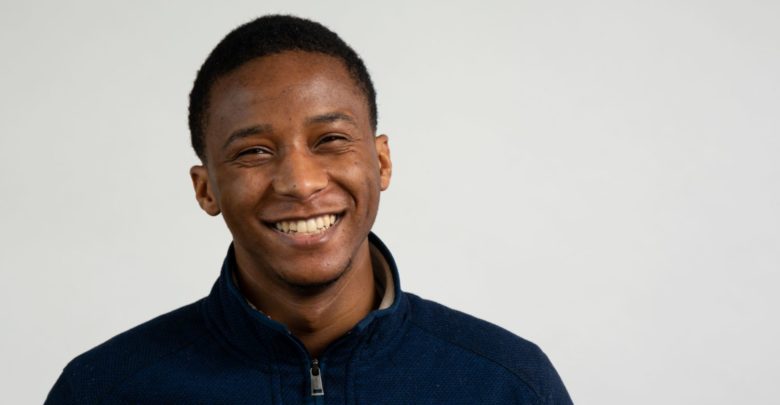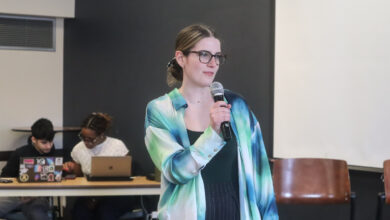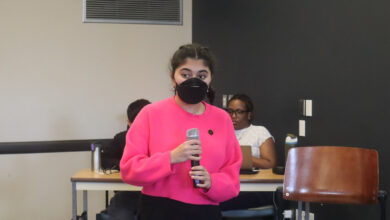 Lochlann Kerr
Lochlann KerrEach year, The Gateway publishes an evaluation of the Students’ Union Executive and the Board of Governors representative. It’s impossible to discuss every aspect of their tenures, so these reports are largely based on the major components of the platform each executive campaigned on, and the most significant responsibilities of their respective positions.
And if you’re short for time, check out our TLDR for a bite-sized breakdown.
Christian Fotang: A-
The vice-president (external) (VPX) is the most outward-facing role in the University of Alberta’s Students’ Union (UASU). They’re responsible for advocating on behalf of students to all levels of government, lobby groups, and other advocacy groups.
Fotang is also the chair for the Canadian Alliance of Student Associations (CASA), which has greatly helped with his advocacy.
More effective strides in making post-secondary education an election issue
With the 2023 provincial election fast-approaching, it’s important now more than ever to put students on the forefront of election issues. Students have greatly suffered at the hands of the United Conservative Party (UCP), who were responsible for the immense budget cuts that led to exceptional tuition increases.
In his platform, Fotang promised to organize a Get Out The Vote (GOTV) campaign to encourage students to vote. Throughout his campaign, he talked about advocating to all levels of government about students’ issues to make us a priority during the election.
These efforts have been much more successful than last year. This is Fotang’s second year in the role, and in his interview he told me this helped him gain the tools he needed to succeed.
Last year, he faced criticisms for not being more active when it came to advocating against tuition increases. When I asked him how he was approaching the GOTV campaign differently this year, he said the benefit of knowing when the election is and not being in the throes of a global pandemic is a huge asset.
Fotang said this extends to mobilizing students in general, as well.
“That kind of instability made it hard to kind of create a program and create a plan. Whereas, [now] we kind of have more predictability, more stability and we just want to make it a fun experience for all students,” he said.
There’s still some time before the election, so GOTV is still in its planning stages. But, Fotang has many challenges before him. The election will be held in May, a time where not many students will be on campus. Voter apathy is already an issue for young people, but this will only make it worse. I hope that Fotang learns from his earlier mistakes, so students will have a say in provincial politics this year.
While there have been talks of having a protest at a Board of Governors (BoG) meeting this spring, I would have liked to see more direct action from Fotang earlier in his term — especially since this is such a pivotal year for provincial politics. Another round of proposed tuition increases are more than likely going to get approved, so protesting at this point feels too little, too late. Protesting is a powerful tool, and an excellent way to advocate externally.
In our interview, Fotang talked about how protesting needs to be well-organized in order to be effective, which I agree with entirely. As this falls into his portfolio, the worry of not having well-organized protests isn’t exactly an excuse not to have them at all. He believes in protesting, he said, and he’d be the first at the rally point. This is great sentiment to have, I just hope Fotang knows there’s no time like the present.
Advocating for affordability for students
In our interview, I asked Fotang what he was most proud of achieving during his time as VPX. He answered the advocacy surrounding affordability for students, especially for international students. For a long time, international students didn’t get the same help in terms of affordability that domestic students got. During the COVID-19 pandemic, international students didn’t qualify for the Emergency Student Benefit, he said.
“When I got into governance, I always heard that international students got left behind. We see that tuition for international students has been going up at any irrationally absurd pace. I’ve been very proud to be at the forefront of the advocacy,” he said.
Fotang said that he played a key role in the temporary elimination of work hours for international students. Previously, international students were limited to working 20 hours a week off-campus. Now, they can work as much as they want, which Fotang hopes to make permanent. This was considered a huge win for international students, who have arguably struggled the most during the cost of living crisis. However, Fotang was ultimately unable to prevent the proposed six per cent tuition increase for international students from being approved.
Through his advocacy, Fotang had, however, been able to minimize the burden of tuition increases for domestic students on a provincial level. Last week, Demetrios Nicolaides, the minister of advanced education, announced a cap of two per cent on tuition increases.
The goals Fotang helped achieve, both through his work as VPX and the chair of CASA, will have long-lasting impacts for both domestic and international students for years. Affordability has been a major concern for students, but with Fotang’s efforts, there has been some meaningful mitigation.
In general, Fotang has done a good job advocating for students’ affordability, but fighting tuition increases should have been a bigger focus. There’s still hope, but it’s unlikely that they won’t be approved at BoG this spring.
Fotang’s term was very successful, and resulted in many wins for students. Improvements were made to transit safety, like improving cell reception and adding more safety mirrors, after meetings with the City of Edmonton, he said. Fotang made huge strides in increasing affordability for students. His work for the international student community was commendable, but they’re still facing tuition increases with no two per cent cap.
The only aspect of his term that fell short, similarly to last year, was the lack of direct action and protests, which would have put a bigger focus on post-secondary education leading up to the provincial election and tuition increases. All in all, this was still a very successful year for Fotang.
TLDR: This year, Fotang was able to bounce back from previous criticisms and take a more direct approach to his advocacy. Although it’s an improvement, I would have liked to see protests sooner in the year. Radical action and strong advocacy are necessary to make post-secondary education an election issue. However, Fotang still made great strides in his advocacy, and he will be remembered for contributing to a two per cent tuition increase cap being brought in for domestic students.
A-range: This person has fulfilled the promises they campaigned on and more, has created tangible change during their tenure, and has shown a commitment to improving the lives of students. Their GPA is top tier.
B-range: This person has done their job consistently well, but has not made any remarkable changes, or has fallen short on important goals they set out in their platforms. They’re doing fine, but it’s nothing to phone home about.
C-range: This person has done their job sufficiently, but has failed to make significant progress in the areas most relevant to their portfolio, or has essentially abandoned a major part of their platform. They’re still passing with a safe buffer though, and Cs get degrees!
D-range: This person has done a very lacklustre job, and has not sufficiently fulfilled their campaign promises or the responsibilities of their position.
F-range: This person has not done their job, has not represented students, and has not fulfilled their campaign promises whatsoever.




